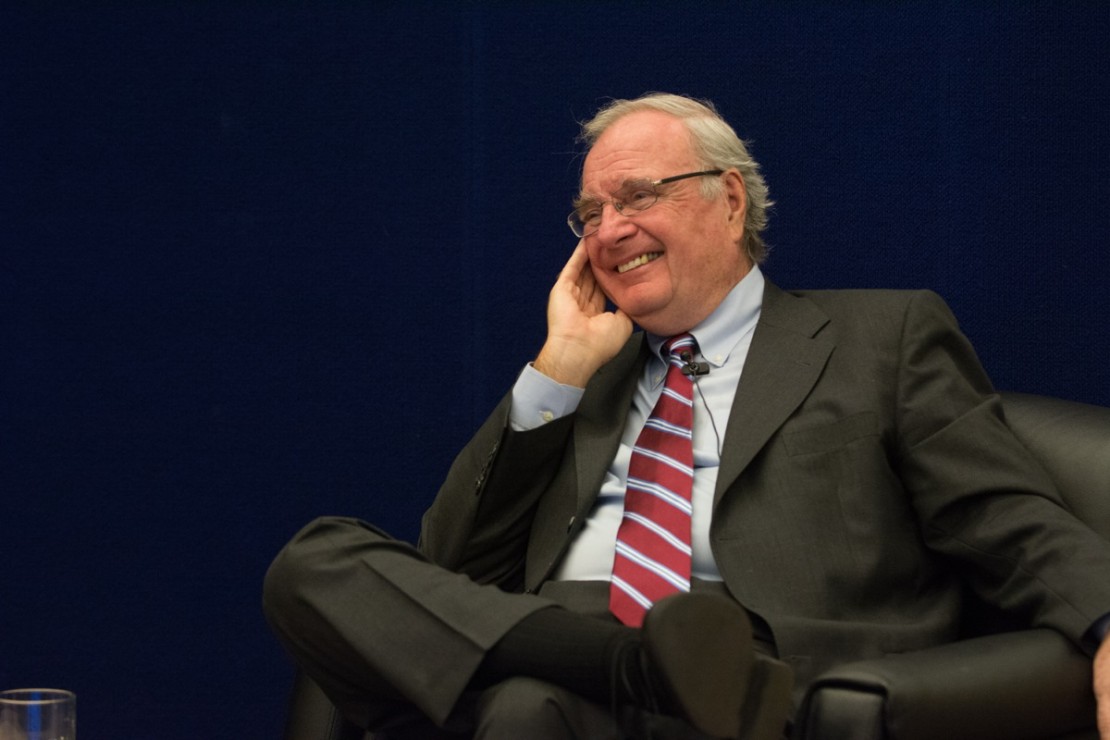
Former prime minister Paul Martin reflects on his career at the inaugural Gordon Smith lecture series on June 2. –Hugo Wong (photo)
Former prime minister Paul Martin joined Gordon Smith for a wide-ranging discussion at the Bob Wright Centre at UVic on June 2. The lectures marked the first in a series named for Smith, who was formerly the director of UVic’s Centre for Global Studies, a deputy minister of foreign affairs, and Canada’s ambassador to the European Union.
In an interview with the Martlet, the former prime minister praised Smith for his accomplishments, particularly regarding the G20 (a group of 20 leading finance ministers). It was an important milestone for both Smith and Martin (the latter who is some- times called “the father of the G20”).
“Gordon Smith is one of Canada’s outstanding public servants and had a tremendous record internationally andstilldoes. . .WhenGordonSmith was in charge of [the Centre for Global Studies], it was very active in the whole creation of the G20. So I wanted to be here for him tonight.”
Addressing a crowd of 160, Martin and Smith discussed “short-termism”, the notion that democracies are not capable of long-term planning due to short election cycles. They also addressed Indigenous education and women’s issues, and members of the audience questioned Martin on global finance and growth in Africa, all interests of Martin’s since he left government.
When asked for an example of short-term thinking in Canada, Martin was careful to clarify that he didn’t want to be partisan, but said that the current government “doesn’t have a foreign policy” and has withdrawn from much of the world.
“I mean, when you see it’s turned its back on Africa, which I think is going to be a major global player, I think that’s the kind of short-sightedness that has to be discussed.”
Martin has focused on Africa since leaving office, chairing NGOs (non-governmental organizations) like the Congo Basin Forest Fund, citing the continent’s potential.
“It is a continent with massive natural resources, massive hydroelectric power, but it also has the highest number of fragile states, and it is very important that Africa get its economic footing, and if it does, it will become, in my opinion, an engine of growth comparable to what China is today.”
In addition to his African efforts, Martin has continued to push for improved living standards for on-reserve Aboriginals with initiatives like the Martin Aboriginal Education Initiative (MAEI), which aids Aboriginal students in high school. While in office, Martin championed the Kelowna Accord, which would have invested over $5 billion in education, health, and housing, but the agreement was never implemented by the Harper government. Recently, Martin has criticized the Harper government for the breakdown in negotiations on Bill C-33, which he claims was underfunded.
“The Indigenous people of Canada love their children, and they want them to have the best education possible. Unfortunately, the federal government, which is responsible for funding that education, under-funds it by a factor of anywhere from 30 to 50 per cent compared to what the provinces spend on education on a per capita basis. That is immoral, that is unconscionable, and for the federal government to say that they’re not going to properly fund that education until the First Nations accept everything that the federal government says is nonsensical.”
During the discussion, Martin and Smith reminisced about their terms in public service, laughing at anecdotes from their time together. He wrapped up the talk by reminiscing about a moment in his teenage years. His father, Paul Martin Sr., was the minister of national health and welfare at the time, and the younger Martin remembered a lesson that fostered his respect for the Canadian civil servants.
“I was in a meeting and he said, ‘Don’t leave. I want you to sit there and I want you to listen, and I want you to understand who you are hearing.’ I asked, ‘Who am I hearing?’ And he said, ‘You’re hearing the people who are going to build the country that you are going to live in. These are the great public servants of our age.’”






